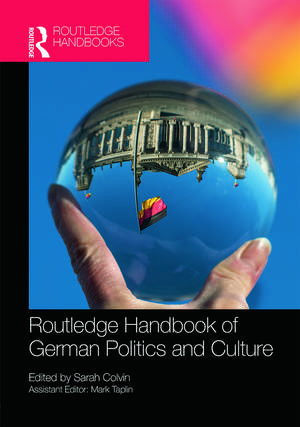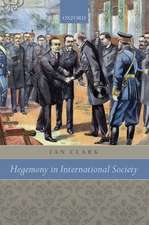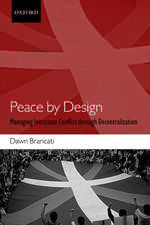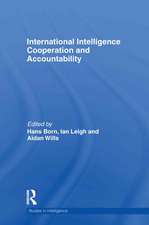The Routledge Handbook of German Politics & Culture
Editat de Sarah Colvinen Limba Engleză Hardback – 8 dec 2014
- historical pathways to contemporary Germany
- the current ‘Berlin Republic’
- society and diversity
- Germany and Europe
- Germany and the world.
| Toate formatele și edițiile | Preț | Express |
|---|---|---|
| Paperback (1) | 390.85 lei 3-5 săpt. | +37.51 lei 6-10 zile |
| Taylor & Francis – 26 sep 2017 | 390.85 lei 3-5 săpt. | +37.51 lei 6-10 zile |
| Hardback (1) | 1358.94 lei 6-8 săpt. | |
| Taylor & Francis – 8 dec 2014 | 1358.94 lei 6-8 săpt. |
Preț: 1358.94 lei
Preț vechi: 2050.81 lei
-34% Nou
Puncte Express: 2038
Preț estimativ în valută:
260.06€ • 282.39$ • 218.45£
260.06€ • 282.39$ • 218.45£
Carte tipărită la comandă
Livrare economică 23 aprilie-07 mai
Preluare comenzi: 021 569.72.76
Specificații
ISBN-13: 9780415686860
ISBN-10: 0415686865
Pagini: 514
Ilustrații: 78
Dimensiuni: 174 x 246 x 33 mm
Greutate: 1.02 kg
Ediția:1
Editura: Taylor & Francis
Colecția Routledge
Locul publicării:Oxford, United Kingdom
ISBN-10: 0415686865
Pagini: 514
Ilustrații: 78
Dimensiuni: 174 x 246 x 33 mm
Greutate: 1.02 kg
Ediția:1
Editura: Taylor & Francis
Colecția Routledge
Locul publicării:Oxford, United Kingdom
Public țintă
Postgraduate and UndergraduateCuprins
Preface Sarah Colvin PART I. Pathways to contemporary Germany 1. The history of a European nation Ute Frevert 2. Humanität, Bildung, Kultur: Germany’s civilizing values Ritchie Robertson 3. Legacies of a significant past: regimes, experiences, and identities Mary Fulbrook 4. World War II in German cultural memory: Dresden as lieu de mémoire Anne Fuchs 5. Modell Deutschland: from the Bonn to the Berlin Republic Jeffrey Anderson PART II. The Berlin Republic 6. The political and constitutional order Eric Langenbacher 7. Party politics and electoral behaviour Thomas Saalfeld and Harald Schoen 8. Citizenship Helen Williams 9. Social wellbeing and democracy Patricia Hogwood 10. Being East German in the Berlin Republic Laurence McFalls with Alexandra Hausstein 11. Visual culture: memory work and arts of the present Andrew Webber PART III. Society and diversity 12. Immigration and integration Alex Street and Randall Hansen 13. Germany as Kulturnation? Identity in diversity Wilfried van der Will and Rob Burns 14 .Theatre and diversity Christel Weiler 15. Religious diversity Volkhard Krech 16. Gender and sexuality Clare Bielby and Frauke Matthes 17. ‘Grey’ culture Stuart Taberner PART IV. Germany and Europe 18. Germany and Europe: negotiating identity in a multicultural present Fatima El Tayeb 19. The place of Europe in contemporary German film Paul Cooke 20. The making of German European policy William E. Paterson 21. German power and ‘embedded hegemony’ in Europe Beverly Crawford 22. The approach to finance in the European context Lothar Funk 23. Climate protection policy: ecological modernization, industrial competitiveness, and Europeanization Rainer Hillebrand PART V. Germany and the world 24. Europeanization and globalization as drivers of the German growth model Kurt Hübner 25. Foreign policy: from ‘civilian power’ to ‘trading state’? Hanns W. Maull 26. Germany and America 1945-2012 James Sperling 27. Sport politics Jonathan Grix 28. Cultural outreach: overcoming the past Gregory Paschalidis
Notă biografică
Sarah Colvin is the Schröder Professor of German at the University of Cambridge, UK.
Mark Taplin is a freelance scholar, editor, and translator.
Mark Taplin is a freelance scholar, editor, and translator.
Recenzii
It could hardly be more important, and at the same time it could hardly be more straightforward. Anyone who wants to understand the difficult options that face today's Europe has to understand what makes contemporary Germany tick. And anyone who wants to understand the new Germany will find the Handbook of German Politics and Culture an essential toolbox of insights for both of these tasks.
Martin Kettle, Chief Leader Writer, The Guardian.
This is an impressively up-to-date and comprehensive survey of contemporary German political, economic and cultural life. It also offers important insights into Germany’s relationship with Europe and the wider world. The contributions, written by an array of internationally renowned scholars, are lively, interesting, informative and engaged. The book will be of great interest to scholars, students and the general public alike.
Professor Bill Niven, Nottingham Trent University, UK.
Anne Fuchs titles her essay, one of 28 in this fine collection, “World War II in cultural memory: Dresden as lieu de mémoire" and concludes, “Trauma, historical contextualization, and reconciliation are the three dominant interpretive schemas that have shaped a self-conscious memory of the Dresden bombing since German unification.” One could argue that many of the pieces deal with these three themes in different ways and from different perspectives—political, economic, through the lens of gender, ethnic, religious, and international relations, among others. The individual contributions (most by experts in their respective fields, from Ute Frevert and Mary Fulbrook to Jeffrey Anderson and Fatima El-Tayeb) are interpretive rather than descriptive, though many feature basic information related to Germany’s current political and economic system along with its cultural and social activities. One can read these individually or note that several themes emerge in multiple essays—e.g., Germany as a European nation and the importance of “soft power” and cultural diplomacy as a feature of late-20th- and 21st-century policy. The book serves as a significant snapshot of contemporary Germany by examining how it arrived at its current position and interrogating what is now defined as "German.”
--M. Deshmukh, emerita, George Mason University
Martin Kettle, Chief Leader Writer, The Guardian.
This is an impressively up-to-date and comprehensive survey of contemporary German political, economic and cultural life. It also offers important insights into Germany’s relationship with Europe and the wider world. The contributions, written by an array of internationally renowned scholars, are lively, interesting, informative and engaged. The book will be of great interest to scholars, students and the general public alike.
Professor Bill Niven, Nottingham Trent University, UK.
Anne Fuchs titles her essay, one of 28 in this fine collection, “World War II in cultural memory: Dresden as lieu de mémoire" and concludes, “Trauma, historical contextualization, and reconciliation are the three dominant interpretive schemas that have shaped a self-conscious memory of the Dresden bombing since German unification.” One could argue that many of the pieces deal with these three themes in different ways and from different perspectives—political, economic, through the lens of gender, ethnic, religious, and international relations, among others. The individual contributions (most by experts in their respective fields, from Ute Frevert and Mary Fulbrook to Jeffrey Anderson and Fatima El-Tayeb) are interpretive rather than descriptive, though many feature basic information related to Germany’s current political and economic system along with its cultural and social activities. One can read these individually or note that several themes emerge in multiple essays—e.g., Germany as a European nation and the importance of “soft power” and cultural diplomacy as a feature of late-20th- and 21st-century policy. The book serves as a significant snapshot of contemporary Germany by examining how it arrived at its current position and interrogating what is now defined as "German.”
--M. Deshmukh, emerita, George Mason University
Descriere
The Routledge Handbook of German Politics and Culture offers a wide-ranging and authoritative account of Germany in the 21st century.














